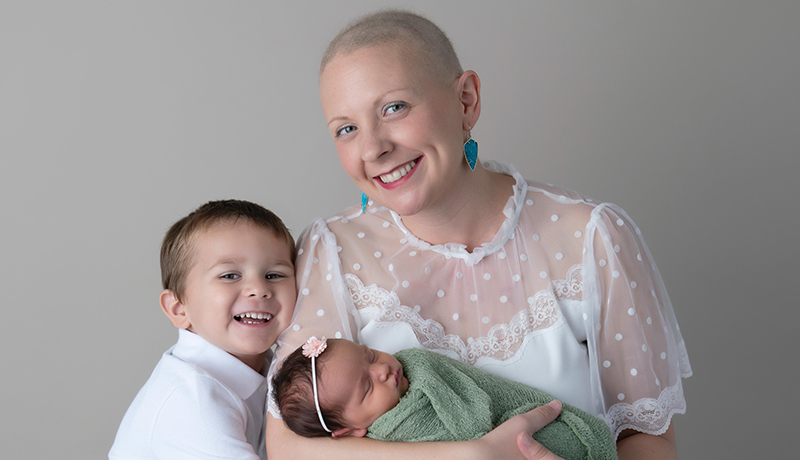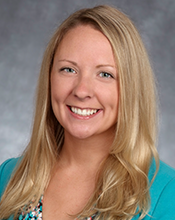Pregnant and Diagnosed: Christina's Journey Through Breast Cancer at 34
October 01, 2025


When Dr. Christina Ortega learned she was pregnant on Valentine’s Day 2019, she recorded a video of the positive test on her phone. After two miscarriages and the joyful arrival of her first child, she was filled with hope about the year ahead. She imagined her son becoming a big brother, shopping for baby girl clothes, and savoring a long-awaited chapter in her family’s story.
But three months later, in the middle of a routine shower, everything changed. She felt a lump. At first she hoped it was a clogged duct from breastfeeding. It wasn’t. At just 34 years old, with no family history of breast cancer and halfway through her pregnancy, Christina was diagnosed with HER2-positive stage 2B breast cancer.
Christina is not only a mom, she is also a pediatric neuropsychologist at Joe DiMaggio Children’s Hospital, caring for children with cancer and complex medical conditions. Suddenly she was on the other side, moving from the role of physician to the role of patient.
A Breast Cancer Diagnosis That Couldn’t Wait
The news was overwhelming. Christina had just finished weaning her toddler. She was young, active, and doing all the things she thought would lower her risk.
When she first raised her concern, she was told the lump could be hormonal or a clogged duct. But she trusted her instincts and pushed for more testing. That persistence led to the ultrasound, mammogram, and biopsy that confirmed cancer.
Breast cancer was not something I thought I would have to face, and certainly not during pregnancy.
Two Goals, One Plan: Treat the Cancer, Protect the Baby
Christina was quickly referred to Atif Hussein, MD, chief of Oncology at Memorial Cancer Institute, who built a care plan that balanced treatment and pregnancy. Working closely with breast surgery, imaging, and Memorial’s maternal-fetal medicine specialists, Dr. Hussein assured Christina that she could continue her pregnancy and begin chemotherapy safely in her second trimester.
Christina received chemotherapy while pregnant, had a port placed, and later underwent a double mastectomy and radiation. Her daughter Zoe was born healthy at 39 weeks.
Today, Christina is more than three years off treatment, thriving in her career at Joe DiMaggio Children’s Hospital, and even running marathons.
From the first meeting, the team at Memorial Cancer Institute laid out a path forward that considered both my health and my daughter’s. That gave me the strength I needed to move ahead.
What Expecting Moms Should Know About Breast Cancer
Pregnancy-associated breast cancer is rare, occurring in an estimated 15 to 35 cases per 100,000 deliveries, but it is still one of the most common cancers diagnosed during pregnancy. Because breasts naturally change during pregnancy and breastfeeding, diagnosis is often delayed.
Here are key points for expecting and new moms:
- Don’t dismiss a lump. If a change lasts more than a couple of weeks, get it checked.
- Imaging is safe. Ultrasound is the first step, and mammography can be performed with shielding when needed.
- Treatment is possible. Certain chemotherapy regimens can be given safely in the second and third trimesters.
- Seek specialized care. An oncology-led, team-based approach that includes maternal-fetal medicine provides the best chance for positive outcomes.
- Advocate and find support. Speak up if something feels off, and lean on family, friends, and support groups for help.
Do not ignore a persistent change. If you feel a lump that does not go away, call your doctor. Most breast changes in pregnancy are not cancer, but timely evaluation matters.
Life After Breast Cancer Treatment
The end of active treatment is often described as a new beginning, but it also brings challenges. Energy returns slowly. Scan anxiety is real.
Christina leaned on exercise, a more plant-forward diet, and personal goals to move forward. Running became her symbol of progress. Crossing the finish line of her first marathon was more than a race, it was proof of resilience.
I want other moms to know they are not alone. You are not too young to be diagnosed. Keep showing up for yourself and your family, even on hard days, because that can be its own kind of strength. But it is just as important to accept help when it is offered, and to not be afraid to ask for it when you need it. As women we are often taught to be the caretakers and juggle many roles, so as foreign as it may feel, it is more than okay to sit back and let yourself be cared for.
How Memorial Supports Families Recovering from Cancer
At Memorial Cancer Institute, patients have access to one of Florida’s largest cancer programs, with medical oncologists, breast surgeons, radiation oncologists, and integrative medicine services working together under one roof. In partnership with Memorial’s Maternal-Fetal Medicine program, expecting mothers with complex diagnoses receive seamless, coordinated care designed around both mother and baby.
At Joe DiMaggio Children’s Hospital, Christina continues her work helping young patients and families navigate serious diagnoses, now with the unique perspective of someone who has faced cancer herself. Her journey is a reminder that behind every diagnosis is a family, a story, and a future worth fighting for.
If you are pregnant or recently postpartum and notice a change in your breast, don’t wait. Contact Memorial Cancer Institute to schedule an evaluation or ask your OB or midwife for a referral.
Christina's Journey
Christina and her family throughout pregnancy, breast cancer, and birth journey.




